英语作文 反对克隆的原因和赞同克隆的原因-精品
反对克隆人类英文作文
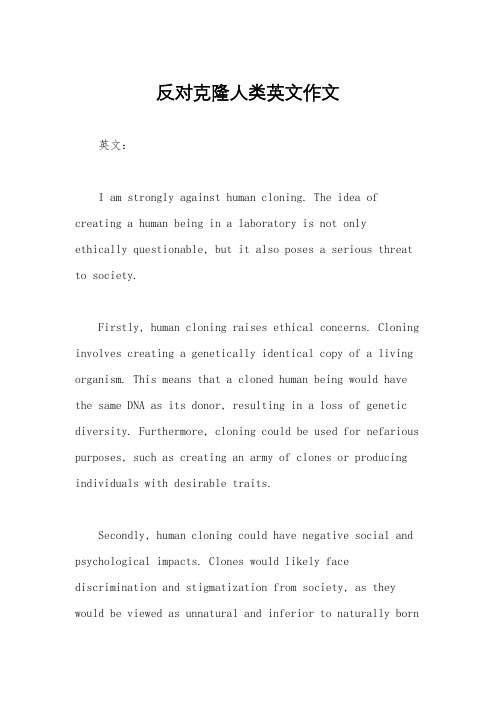
反对克隆人类英文作文英文:I am strongly against human cloning. The idea of creating a human being in a laboratory is not onlyethically questionable, but it also poses a serious threat to society.Firstly, human cloning raises ethical concerns. Cloning involves creating a genetically identical copy of a living organism. This means that a cloned human being would have the same DNA as its donor, resulting in a loss of genetic diversity. Furthermore, cloning could be used for nefarious purposes, such as creating an army of clones or producing individuals with desirable traits.Secondly, human cloning could have negative social and psychological impacts. Clones would likely face discrimination and stigmatization from society, as they would be viewed as unnatural and inferior to naturally bornhumans. Additionally, clones may struggle with identity issues and a lack of individuality, as they would be exact replicas of their donor.Lastly, the technology for human cloning is not yet fully developed and safe. The process of cloning has a high failure rate, resulting in the deaths of many cloned animals. The risks of cloning a human being are even greater, as the consequences of failure could be catastrophic.In conclusion, human cloning is a dangerous and unethical practice that should be banned. We mustprioritize the well-being and diversity of our society over the potential benefits of cloning.中文:我强烈反对人类克隆。
反对克隆发展的英语作文
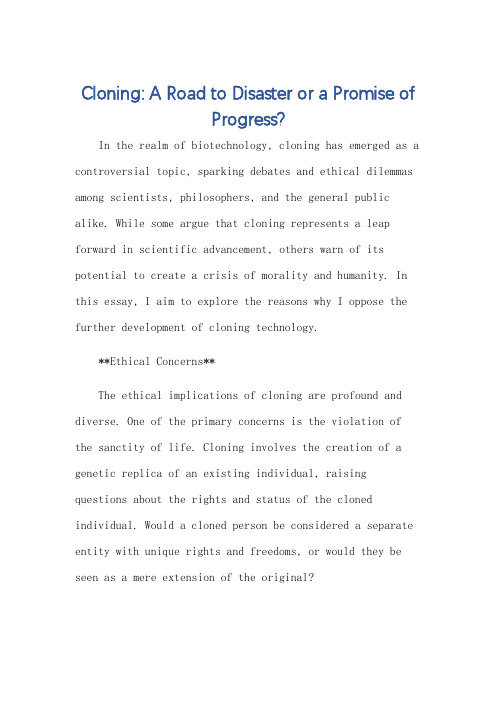
Cloning: A Road to Disaster or a Promise ofProgress?In the realm of biotechnology, cloning has emerged as a controversial topic, sparking debates and ethical dilemmas among scientists, philosophers, and the general public alike. While some argue that cloning represents a leap forward in scientific advancement, others warn of its potential to create a crisis of morality and humanity. In this essay, I aim to explore the reasons why I oppose the further development of cloning technology.**Ethical Concerns**The ethical implications of cloning are profound and diverse. One of the primary concerns is the violation of the sanctity of life. Cloning involves the creation of a genetic replica of an existing individual, raising questions about the rights and status of the cloned individual. Would a cloned person be considered a separate entity with unique rights and freedoms, or would they be seen as a mere extension of the original?Moreover, cloning raises concerns about theexploitation of vulnerable individuals. For instance, in the case of human cloning, it is conceivable that individuals may be coerced or pressured into becoming clones, violating their autonomy and dignity. Similarly, in animal cloning, the welfare of the cloned animals is often compromised, with many suffering from health problems and shortened lifespans.**Social Impact**The social implications of cloning are also profound. The widespread availability of cloning technology could lead to a fundamental shift in social norms and values. The cloning of humans, for instance, could lead to a society where genetic traits and abilities become commoditized, leading to a new form of eugenics. This could potentially lead to discrimination and the marginalization of those who do not meet certain genetic criteria, undermining the principles of equality and inclusivity.Furthermore, cloning could have a significant impact on family structures and relationships. The cloning of a family member, for instance, could lead to complexemotional and psychological dynamics that strain existing relationships. The cloned individual may feel a sense of displacement and lack of identity, while the original may feel a sense of displacement and redundancy.**Scientific Uncertainty**Finally, the scientific uncertainties surrounding cloning add to the reasons for opposition. Although cloning technology has made significant progress in recent years, there are still many unanswered questions and potential risks involved. For instance, the health and lifespan of cloned animals have often been found to be compromised, due to issues related to genetic expression and epigenetic modifications. Similarly, the long-term effects of cloning on humans are largely unknown, making it a highly risky and unethical experiment.**In Conclusion**The development of cloning technology represents a significant milestone in biotechnology, but it also poses a series of ethical, social, and scientific challenges that need to be carefully considered. In my view, the potential downsides of cloning far outweigh the potential benefits.The violation of the sanctity of life, the exploitation of vulnerable individuals, the disruption of social norms and family structures, and the scientific uncertainties surrounding cloning are all reasons why I oppose the further development of this technology. While science and technology have the potential to bring about remarkable advancements, it is crucial that we also prioritize ethics and humanity in our pursuit of knowledge and progress.**克隆:灾难之路还是进步之约?**在生物技术领域,克隆已成为一个备受争议的话题,引发了科学家、哲学家和广大公众之间的辩论和道德困境。
反对克隆技术的英语小作文
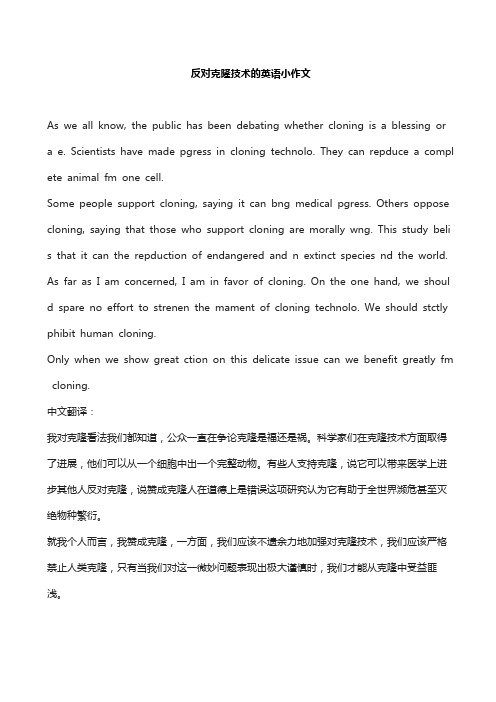
反对克隆技术的英语小作文As we all know, the public has been debating whether cloning is a blessing or a e. Scientists have made pgress in cloning technolo. They can repduce a compl ete animal fm one cell.Some people support cloning, saying it can bng medical pgress. Others oppose cloning, saying that those who support cloning are morally wng. This study beli s that it can the repduction of endangered and n extinct species nd the world. As far as I am concerned, I am in favor of cloning. On the one hand, we shoul d spare no effort to strenen the mament of cloning technolo. We should stctly phibit human cloning.Only when we show great ction on this delicate issue can we benefit greatly fm cloning.中文翻译:我对克隆看法我们都知道,公众一直在争论克隆是福还是祸。
科学家们在克隆技术方面取得了进展,他们可以从一个细胞中出一个完整动物。
有些人支持克隆,说它可以带来医学上进步其他人反对克隆,说赞成克隆人在道德上是错误这项研究认为它有助于全世界濒危甚至灭绝物种繁衍。
反对克隆的理由英语作文
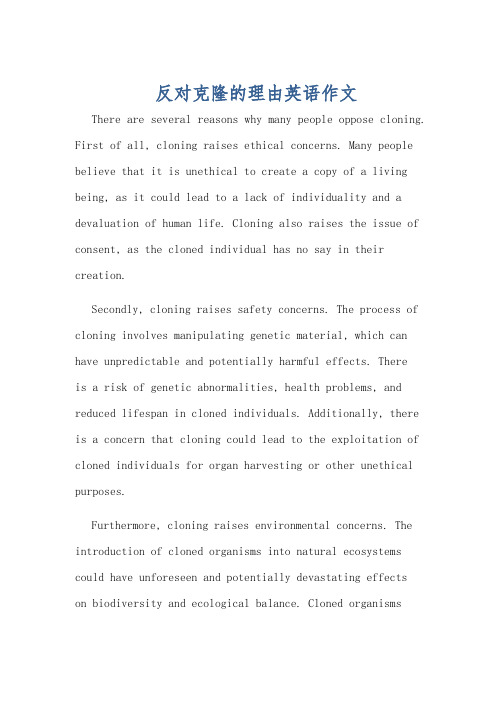
反对克隆的理由英语作文There are several reasons why many people oppose cloning. First of all, cloning raises ethical concerns. Many people believe that it is unethical to create a copy of a living being, as it could lead to a lack of individuality and a devaluation of human life. Cloning also raises the issue of consent, as the cloned individual has no say in their creation.Secondly, cloning raises safety concerns. The process of cloning involves manipulating genetic material, which can have unpredictable and potentially harmful effects. Thereis a risk of genetic abnormalities, health problems, and reduced lifespan in cloned individuals. Additionally, there is a concern that cloning could lead to the exploitation of cloned individuals for organ harvesting or other unethical purposes.Furthermore, cloning raises environmental concerns. The introduction of cloned organisms into natural ecosystems could have unforeseen and potentially devastating effectson biodiversity and ecological balance. Cloned organismsmay also compete with natural populations for resources, leading to disruptions in the natural environment.In addition, there are practical concerns about the potential misuse of cloning technology. Cloning could be used for nefarious purposes, such as creating armies of cloned soldiers or producing clones for exploitative labor. There is also a concern that cloning could be used to perpetuate harmful genetic traits or to create individuals for specific, predetermined purposes.Overall, the opposition to cloning is based on a combination of ethical, safety, environmental, andpractical concerns. Many people believe that the risks and potential negative consequences of cloning outweigh any potential benefits.克隆技术引起了伦理问题,许多人认为克隆生物的出现将导致缺乏个体特征和人类生命贬值的风险。
反对克隆发展的英语作文

反对克隆发展的英语作文Title: A Discourse against the Development of CloningIn an era where scientific advancements are made at a dizzying pace, the prospect of cloning has emerged as a controversial topic that has divided the global community.While some argue that cloning holds great potential for medical breakthroughs and species preservation, I steadfastly oppose its development due to ethical, moral, and social implications.标题:论反对克隆技术的发展在这个科学进步日新月异的时代,克隆技术的出现成为了一个引起全球争议的话题。
尽管有人认为克隆技术在医疗突破和物种保护方面具有巨大潜力,但我坚决反对其发展,因为这涉及到伦理、道德和社会影响的问题。
Firstly, the ethical dilemmas surrounding cloning are immense.The creation of a living being that is genetically identical to another raises questions about the uniqueness and individuality of life.It challenges the natural order of procreation and tampers with the sanctity of life, which is a slippery slope that could lead to unforeseen consequences.首先,克隆技术引发的伦理难题重重。
克隆的利弊辩论赛英语作文
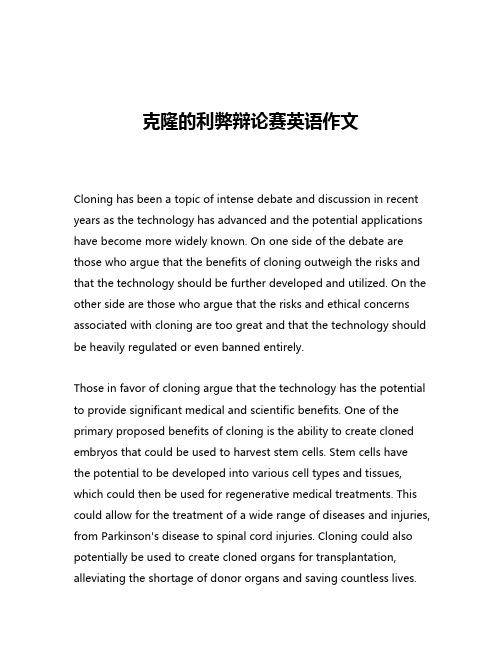
克隆的利弊辩论赛英语作文Cloning has been a topic of intense debate and discussion in recent years as the technology has advanced and the potential applications have become more widely known. On one side of the debate are those who argue that the benefits of cloning outweigh the risks and that the technology should be further developed and utilized. On the other side are those who argue that the risks and ethical concerns associated with cloning are too great and that the technology should be heavily regulated or even banned entirely.Those in favor of cloning argue that the technology has the potential to provide significant medical and scientific benefits. One of the primary proposed benefits of cloning is the ability to create cloned embryos that could be used to harvest stem cells. Stem cells have the potential to be developed into various cell types and tissues, which could then be used for regenerative medical treatments. This could allow for the treatment of a wide range of diseases and injuries, from Parkinson's disease to spinal cord injuries. Cloning could also potentially be used to create cloned organs for transplantation, alleviating the shortage of donor organs and saving countless lives.Additionally, proponents of cloning argue that the technology could be used to preserve the genetic information of endangered species, allowing for the potential future reintroduction of these species. This could be particularly valuable for species that are on the brink of extinction due to human activities or environmental changes. Cloning could also potentially be used to create cloned copies of beloved pets, allowing pet owners to continue to enjoy the companionship of their animals even after they have passed away.Furthermore, some argue that cloning could have important implications for human reproduction, allowing infertile individuals or same-sex couples to have genetically related children. This could provide a means for these individuals to experience the joys of parenthood and pass on their genetic legacies.However, those opposed to cloning argue that the technology raises significant ethical and moral concerns that outweigh the potential benefits. One of the primary concerns is the potential for the technology to be misused or abused. There are fears that cloning could be used to create "designer babies" with desirable genetic traits, leading to a new form of genetic discrimination and inequality. There are also concerns that cloning could be used for nefarious purposes, such as the creation of cloned soldiers or the cloning of political or social leaders.Additionally, opponents of cloning argue that the process of creating a cloned embryo is inherently risky and can lead to significant health problems for the clone. There is a high rate of failure and abnormalities associated with cloning, and many cloned animals have been found to have a range of health issues, including increased rates of cancer, premature aging, and organ dysfunction. There are concerns that these same issues could manifest in cloned humans, leading to significant physical and psychological harm.Moreover, opponents of cloning argue that the technology raises profound ethical and philosophical questions about the nature of human identity and the sanctity of human life. There are concerns that cloning could undermine the uniqueness of each individual and lead to a devaluation of human life. There are also concerns that cloning could have significant implications for the traditional family structure and the way in which we think about parenthood and kinship.In conclusion, the debate over the pros and cons of cloning is a complex and multifaceted one, with valid arguments on both sides. While the potential benefits of cloning, such as the development of regenerative medical treatments and the preservation of endangered species, are significant, the ethical and moral concerns associated with the technology are also substantial. Ultimately, the decision ofwhether to further develop and utilize cloning technology will require careful consideration of the evidence and a thoughtful weighing of the potential risks and rewards.。
克隆恐龙的原因英文作文
克隆恐龙的原因英文作文Title: The Enigma of Dinosaur Cloning: Unveiling the Unthinkable。
1. Unleashing the Past: The Unseen Drive。
In the realm of scientific curiosity, the idea of cloning dinosaurs is not just a figment of imagination, but a tantalizing quest to unravel the mysteries of our prehistoric ancestors. The urge to revive these long-lost creatures stems from a deep desire to understand the evolutionary tapestry and the potential lessons they hold.2. The Timeless Appeal: A Window into Extinction。
The allure of dinosaur cloning lies in the opportunity to witness firsthand the majesty and vulnerability of these awe-inspiring creatures. Each dinosaur, with its unique anatomy and behavioral traits, represents a snapshot from a bygone era. By cloning them, we'd be granted a front-rowseat to their existence, a chance to witness the power of evolution in action.3. Conservation and Conservationism。
英语作文对克隆的看法
英语作文对克隆的看法篇一:克隆的英语辩论Cloning is the replication of an exact genetic copy of an organism by use of a somatic tissue (or cell) from the donor organism. Cloning can be used in humans, human organs, or even animals.克隆是利用体细胞组织的一个确切的一个生物体的遗传复制的复制(或细胞)从供体生物。
克隆技术可应用于人类,人类的器官,甚至动物。
A benefit of cloning is cloning human organs or body parts. If a person has a dysfunctional liver or heart then they could get it cloned and get a brand new one. These are some of the benefits of cloning.克隆的一个好处是克隆人体器官或身体部位。
如果一个人有一个不正常的肝脏或心脏就可以得到克隆并获得一个新品牌。
这些都是一些好处的克隆。
Cloning can bring many benefits to the human, such as rejuvenation, helpful for Defective genes, Liver failure, Kidney failure and Leukemia. These disease are very different to cure, if we use the cloning technology we can change the Gene’s DNA order, so we can save lots of people.克隆也会给人类带来很多好处,如振兴,有利于缺陷基因,肝功能衰竭,肾功能衰竭和白血病。
支持克隆的理由英语作文
支持克隆的理由英语作文精选英文支持克隆的理由英语作文:The Rationality of Supporting CloningIn the realm of scientific advancements, cloning has emerged as a controversial yet potentially transformative technology. While many argue against it due to ethical and moral considerations, I firmly believe that cloning holds significant advantages and should be explored further.Firstly, cloning can provide remarkable benefits in the medical field. Through therapeutic cloning, doctors could create tissue or organs tailored to an individual's genetic makeup, thereby reducing the risk of rejection during transplantation. This advancement could save countless lives by overcoming the current shortage of organ donors. Additionally, cloning technology could assist in the development of new drugs and treatments, accelerating the pace of medical research.Secondly, cloning could be a powerful tool for the preservation of endangered species. By cloning endangered animals, we could replenish their dwindling populations and ensure their survival. This not only safeguards biodiversity but also preserves the ecological balance that these species play a crucial role in maintaining.Moreover, cloning could revolutionize agriculture. Crops could be cloned to produce genetically superior plants that are more resistant to pests, diseases, and drought. This would increase yields, reduce the need for pesticides and herbicides, and contribute to a more sustainable and environmentally friendly agricultural system.Furthermore, cloning technology has the potential to address the issue of infertility. Couples struggling with infertility could benefit from cloning techniques that allow them to have genetically related children. This would not only bring joy to these individuals but also fulfill their desire to have a family.In conclusion, while cloning poses ethical and moral challenges, its potential benefits in medicine, conservation, agriculture, and fertility are too significant to ignore. With proper regulation and oversight, cloning could become a powerful tool for improving human lives and preserving our planet's biodiversity. Therefore, I firmly believe that we should continue to explore and develop cloning technology.中文对照翻译:支持克隆的合理性在科学进步领域,克隆已成为一项有争议但具有潜在变革性的技术。
反对克隆的理由英语作文
反对克隆的理由英语作文English: Cloning is a controversial topic with many ethical, moral, and practical implications. One of the main reasons why people oppose cloning is because it raises serious ethical concerns regarding the manipulation and exploitation of human life. Cloning involves creating a genetically identical copy of an existing organism, which raises questions about the uniqueness and individuality of each person. Additionally, there are concerns about the potential misuse of cloning technology for unethical purposes, such as creating designer babies or harvesting organs from clones. Cloning also poses risks to the health and well-being of the cloned individual, as there have been instances of genetic abnormalities and health issues in cloned animals. Furthermore, cloning raises concerns about the impact on genetic diversity and the environment if cloned organisms were to be introduced into the ecosystem. Overall, the moral, ethical, and practical issues surrounding cloning provide strong reasons to oppose this technology.中文翻译: 克隆是一个备受争议的话题,涉及众多伦理、道德和实际影响。
- 1、下载文档前请自行甄别文档内容的完整性,平台不提供额外的编辑、内容补充、找答案等附加服务。
- 2、"仅部分预览"的文档,不可在线预览部分如存在完整性等问题,可反馈申请退款(可完整预览的文档不适用该条件!)。
- 3、如文档侵犯您的权益,请联系客服反馈,我们会尽快为您处理(人工客服工作时间:9:00-18:30)。
反对克隆的原因和赞同克隆的原因
反对克隆的原因和赞同克隆的原因,还要有自己的观点
Westhusin's experience with cloning animals leaves him upset by all this talk of human cloning. In three years of work on the Missy project, using hundreds upon hundreds of dog's eggs, the AM team has produced only a dozen or so embryos (胚胎) carrying Missy's DNA. None have survived the transfer to a surrogate (代孕的) mother. The wastage of eggs and the many spontaneously aborted fetuses (胎) may be acceptable when you're dealing with cats or bulls, he argues, but not with humans. Cloning is incredibly inefficient, and also dangerous, he says.
Even so, dog cloning is a mercial opportunity, with a nice research payoff. Ever since Dolly the sheep was cloned in 1997, Westhusin's phone has been ringing with people calling in hopes of duplicating their cats and dogs, cattle and horses. A lot of people want to clone pets, especially if the price is right, says Westhusin. Cost is no obstacle for Missy's mysterious billionaire owner; he's put up $3.7 million so far to fund AM's research.
Contrary to some media reports, Missy is not dead. The owner wants a twin to carry on Missy's fine qualities after she does die. The prototype is, by all accounts, athletic, good-natured and supersmart. Missy's master does not expect an exact copy of her. He knows her clone may not have her temperament. In a statement of purpose, Missy's owner and the AM team say they are both looking forward to studying the ways that her clones differ from Missy.
Besides cloning a great dog, the project may contribute insight into the old question of nature vs. nurture. It could also lead to the cloning of special rescue dogs and many endangered animals.
However, Westhusin is cautious about his work. He knows that even if he gets a dog pregnant, the offspring, should they survive, will face the problems shown at birth by other cloned animals: abnormalities like immature lungs and heart and weight problems~ Why would you ever want to clone humans, Westhusin asks, when we're not even close to getting it worked out in animals yet?
2019年11月30日。
